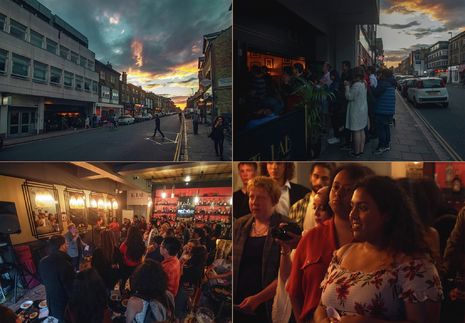Meet Bread, the Theatre Company fighting for diversity in Cambridge
Shruti Sharma speaks to the people behind Bread Theatre Company about their past, present, and future efforts to make Cambridge Theatre more diverse

Representation in Theatre is all-encompassing; it applies to casting selections, acting and directing roles, and choices of plays and playwrights, whether it be on stage in Cambridge, or UK-wide. However, BAME representation in UK theatre, both on and off stage, is still rare as reported by the Arts Council (Arts Council England: Analysis of Theatre in England, 2016). Rather than adopt solutions whereby minority students find themselves invited to increase diversity rather than being able to take space, Ananya Mishra and Suchitra Sebastian founded the newly minted Bread Theatre and Film Company to be a fresh voice for representation in Cambridge. Bread aims to use new narratives to transform existing artistic spaces, its name taken from a poem by Salvadorian poet Roques Dalton: “I believe the world is beautiful and that poetry, like bread, is for everyone.”
I first encountered Bread when I attended their first production (supported by the Marlowe Society and ETG), an adaptation of Abhishek Majumdar’s Djinns of Eidgah in the Corpus Playroom. A composition on the military occupation in Kashmir, the performance gave life to the stories of the marginalized civilians in the embattled territory. As an avid local theatregoer, this was the first time I had seen a production and cast so rich in cultural and ethnic diversity. The Varsity review for their play made it clear that a fresh representative voice in the performing arts was both welcome and needed: “This is tragic and haunting theatre characterised by a richness and captivating quality throughout […] Given that all but one of this play’s cast are actors of an ethnic minority background, it does beg the question why Cambridge theatre casts are still overwhelmingly white. This is a loss for the casts, directors and audiences, but most importantly the actors themselves!”.
Bread was launched in June 2019 at The Lab, Cambridge, in a joyous celebration of taking space, performing spoken word, Hip Hop, Jazz, sketches, and more to a jam-packed audience of students, academics, and Cambridge residents. I spoke to Ananya Mishra, Suchitra Sebastian, and Bread’s current president Shameera Lin on their stories of founding Bread, as well as their current endeavours.

How did Bread come about?
“Bread’s work builds on four-year-old efforts to change the face of Cambridge theatre. Student productions of Shakespeare with an all-BAME cast started despite criticism, and are now a mainstay supported by the Marlowe Society. This year saw the largest ever black cast on the ADC stage in a production of Danai Gurira’s The Convert, a production that was unanimously praised for the Zimbabwean history it brought to the stage.” Bread Theatre and Film Company wants to catalyse this slow murmur of connecting voices into a movement.
What are your ambitions for this year?
“We aim to create productions of professional calibre in cities across the UK, focusing on cutting edge theatre techniques, experimental forms, and innovative writing.” In the aim of exploring more experimental forms of theatre and making the stage accessible to overlooked performers and playwrights, Bread’s programming includes a series of workshops known as Bread Labs (hosted at The Lab, in collaboration with Jason Mellad – a Cambridge alumnus, and Bread's first patron), that bring industry theatre professionals to Cambridge. This term’s Bread Labs include the first BAME director at the National Theatre, Jatinder Verma.
“Though we love staging our own work, we are also involved in ADC pitching panels to actively affect decision-making to select which plays to stage at the ADC and Corpus Playroom”. This has helped to bring eight BAME-focussed shows to the ADC and Corpus Playroom just in Lent term 2020, in comparison to just three such performances over the entirety of Cambridge theatre history prior to 2019. “These productions grapple with lesser-known narratives from a variety of performance traditions, bringing new writing and less familiar playwrights into focus.” Bread’s efforts have been warmly and enthusiastically received by the community, bringing in fresh faces to auditions and drawing new audiences to the theatre.
 Features / Are you more yourself at Cambridge or away from it? 27 January 2026
Features / Are you more yourself at Cambridge or away from it? 27 January 2026 News / Vigil held for tenth anniversary of PhD student’s death28 January 2026
News / Vigil held for tenth anniversary of PhD student’s death28 January 2026 Interviews / Lord Leggatt on becoming a Supreme Court Justice21 January 2026
Interviews / Lord Leggatt on becoming a Supreme Court Justice21 January 2026 News / Reform candidate retracts claim of being Cambridge alum 26 January 2026
News / Reform candidate retracts claim of being Cambridge alum 26 January 2026 Comment / How Cambridge Made Me Lose My Faith26 January 2026
Comment / How Cambridge Made Me Lose My Faith26 January 2026










